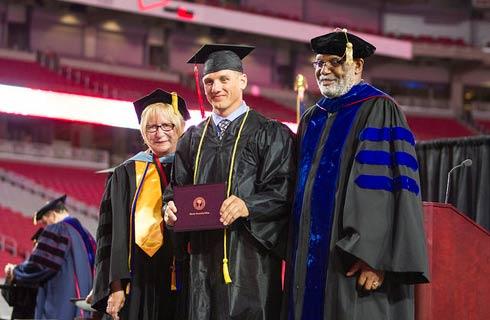- IDP China>
- 课程库>
- 工程与技术>
- 工程>
- 系统工程学>
- Master of Science in Intelligent Systems Engineering - Neuroengineering
智能系统工程理学硕士-神经工程
Master of Science in Intelligent Systems Engineering - Neuroengineering

学历文凭
Masters Degree

专业院系
Department of Intelligent Systems Engineering

开学时间

课程时长

课程学费

国际学生入学条件
IDP—雅思考试联合主办方

雅思考试总分
7.0
- 雅思总分:7
- 托福网考总分:100
- 托福笔试总分:160
- 其他语言考试:120 or above for Duolingo
CRICOS代码:
申请截止日期: 请与IDP联系 以获取详细信息。
课程简介
In our Master of Science in Intelligent Systems Engineering (ISE) program, you will get technical expertise in computational engineering and artificial intelligence—the future of engineering and problem solving. This two-year program teaches you to use modern approaches and design principles to develop systems or devices that gather, interpret, and use data. You can work in the microscopic sensors that make our devices, homes, and vehicles “smart.” Go into advanced health diagnostics and tissue engineering. Master the massive systems that analyze the flood of data around us and drive decision making. Neuroengineering studies, enhances, monitors, heals, and replicates the nervous system. Neuroengineers have the unique opportunity to link theories of the mind to applications that can build intelligent machines and software. Advances in this field will bring about repairs for damaged nervous systems, new devices to read brain function, and smart machines to accomplish tasks. Microscale devices that couple nervous systems with physical systems also can lead to new cognitive development as well as computations that form the basis of memory systems.
相关申请
 预科
预科 奖学金
奖学金 实习机会
实习机会 在校学习
在校学习 跨境学习
跨境学习 校园授课-线上开始
校园授课-线上开始 在线/远程学习
在线/远程学习
开学时间&学费
学费信息仅供参考,请与IDP联系以获取详细信息
| 开学时间 | 时长 | 学费 | 地点 |
|---|
学校排名

世界排名134
数据源:
泰晤士高等教育世界大学排名
本校相关课程

视觉科学哲学博士
学历文凭
Ph.D.
开学日期
课程费用总额


听力学博士
学历文凭
Ph.D.
开学日期
课程费用总额


语言与听力科学哲学博士
学历文凭
Ph.D.
开学日期
课程费用总额


第二语言研究哲学博士
学历文凭
Ph.D.
开学日期
课程费用总额


宗教学哲学博士
学历文凭
Ph.D.
开学日期
课程费用总额


西班牙语言学哲学博士
学历文凭
Ph.D.
开学日期
课程费用总额

其他相关课程

系统工程理学学士/系统工程理学硕士
 乔治梅森大学
乔治梅森大学泰晤士高等教育世界大学排名:426
学历文凭
Combined Baccalaureate and Master's Prog
开学日期
课程费用总额


Graduate Certificate in Integrated Systems Engineering
 北伊利诺伊大学
北伊利诺伊大学泰晤士高等教育世界大学排名:910
学历文凭
Graduate Certificate
开学日期
课程费用总额


Masters of Science in Datacenter Systems Engineering
 南卫理公会大学
南卫理公会大学学历文凭
Masters Degree
开学日期
课程费用总额


Graduate Certificate in Advanced Systems Engineering
 斯蒂文斯理工学院
斯蒂文斯理工学院泰晤士高等教育世界大学排名:560
学历文凭
Graduate Certificate
开学日期
课程费用总额


Doctor of Philosophy in Systems Engineering and Operations Research
 乔治梅森大学-INTO USA
乔治梅森大学-INTO USA学历文凭
Ph.D.
开学日期
课程费用总额


计算机与系统工程理学硕士
 伦斯勒理工学院
伦斯勒理工学院泰晤士高等教育世界大学排名:554
学历文凭
Masters Degree
开学日期
课程费用总额











